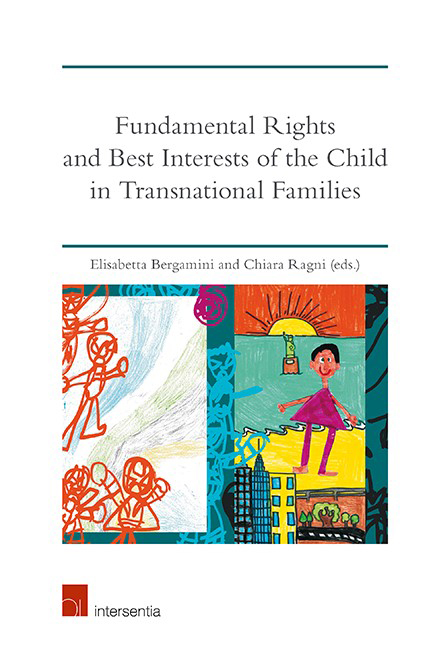Book contents
- Frontmatter
- Dedication
- Preface
- Acknowledgements
- Contents
- List of Cases
- List of Authors
- PART I THE IMPACT OF HUMAN RIGHTS AND OF THE BEST INTERESTS OF THE CHILD ON EU FREE MOVEMENT AND MIGRATION LAW
- Human Rights of Children in the EU Context: Impact on National Family Law
- Protecting EU Citizen Minors' Right to Identity in the Transnational Family Context
- The Best Interests Principle's Impact on Decisions Concerning Asylum-Seeking and Refugee Children
- Human Rights and the Best Interests of the Child in European Family Reunification Law
- Rainbow Families and EU Free Movement Law
- Kafala and Family Reunification of Third-Country Nationals
- Against a Girl's Will: Child Marriages, Immigration and the Directive on Family Reunification
- PART II THE BEST INTERESTS OF THE CHILD AS A CONCERN OF HUMAN RIGHTS AND EUROPEAN PRIVATE INTERNATIONAL LAW
- Index
- About the Editors
Protecting EU Citizen Minors' Right to Identity in the Transnational Family Context
from PART I - THE IMPACT OF HUMAN RIGHTS AND OF THE BEST INTERESTS OF THE CHILD ON EU FREE MOVEMENT AND MIGRATION LAW
Published online by Cambridge University Press: 12 November 2019
- Frontmatter
- Dedication
- Preface
- Acknowledgements
- Contents
- List of Cases
- List of Authors
- PART I THE IMPACT OF HUMAN RIGHTS AND OF THE BEST INTERESTS OF THE CHILD ON EU FREE MOVEMENT AND MIGRATION LAW
- Human Rights of Children in the EU Context: Impact on National Family Law
- Protecting EU Citizen Minors' Right to Identity in the Transnational Family Context
- The Best Interests Principle's Impact on Decisions Concerning Asylum-Seeking and Refugee Children
- Human Rights and the Best Interests of the Child in European Family Reunification Law
- Rainbow Families and EU Free Movement Law
- Kafala and Family Reunification of Third-Country Nationals
- Against a Girl's Will: Child Marriages, Immigration and the Directive on Family Reunification
- PART II THE BEST INTERESTS OF THE CHILD AS A CONCERN OF HUMAN RIGHTS AND EUROPEAN PRIVATE INTERNATIONAL LAW
- Index
- About the Editors
Summary
INTRODUCTION
This chapter considers how living in a transnational context might affect the identity of children who are EU citizens and how EU law protects their identity against Member State (MS) measures that could threaten its integrity and cross-border continuity just because of the children's transnational situation. The key question is whether, despite the lack of a specific competence, the EU legal framework provides effective protection for constitutive elements of children's identity in transnational situations and, then, under which circumstances this legal framework applies to prevent national measures from jeopardising that identity.
In answering this question, this chapter goes beyond the traditional approach that circumscribes research to the question as to how the denial of recognition of personal and family status in cross-border situations could jeopardise people's identities within the EU. First, the traditional approach considers just cross-border situations, i.e. in which the exercise of free movement rights within EU territory give rise to issues affecting identity, whereas this chapter also considers situations in which a static EU citizen minor invokes the right to reside in and to not leave a MS territory. Moreover, the approach here adopted demonstrates that, even when dealing with cross-border situations, children's identity can be affected in various ways beyond the non-recognition of family status and, notably, the denial of the right to family reunification (with a certain family member).
Ultimately, this chapter traces the evolution of the CJEU's approach to the issue; it began as an ‘all about internal market or migration’ approach and then became an approach also significantly based on fundamental rights.
IDENTITY AS A FUNDAMENTAL RIGHT UNDER INTERNATIONAL AND EU LAW
Issues of ‘identity’ can arise on numerous grounds – nationality, gender, sexuality, ethnicity, family relationships and so on – relating to the concrete, unequivocal circumstances of someone's personality and social life as cultural, professional, religious, political and social experiences. Starting from birth, an individual's identity is formed and preserved by registration as somebody's son or daughter, the bestowal of a name and the acquisition of State citizenship. Then, as an individual develops a personality, enters social groups and gains various social experiences, identity becomes more complex, needing broader legal protection from public or private interference.
- Type
- Chapter
- Information
- Publisher: IntersentiaPrint publication year: 2019



